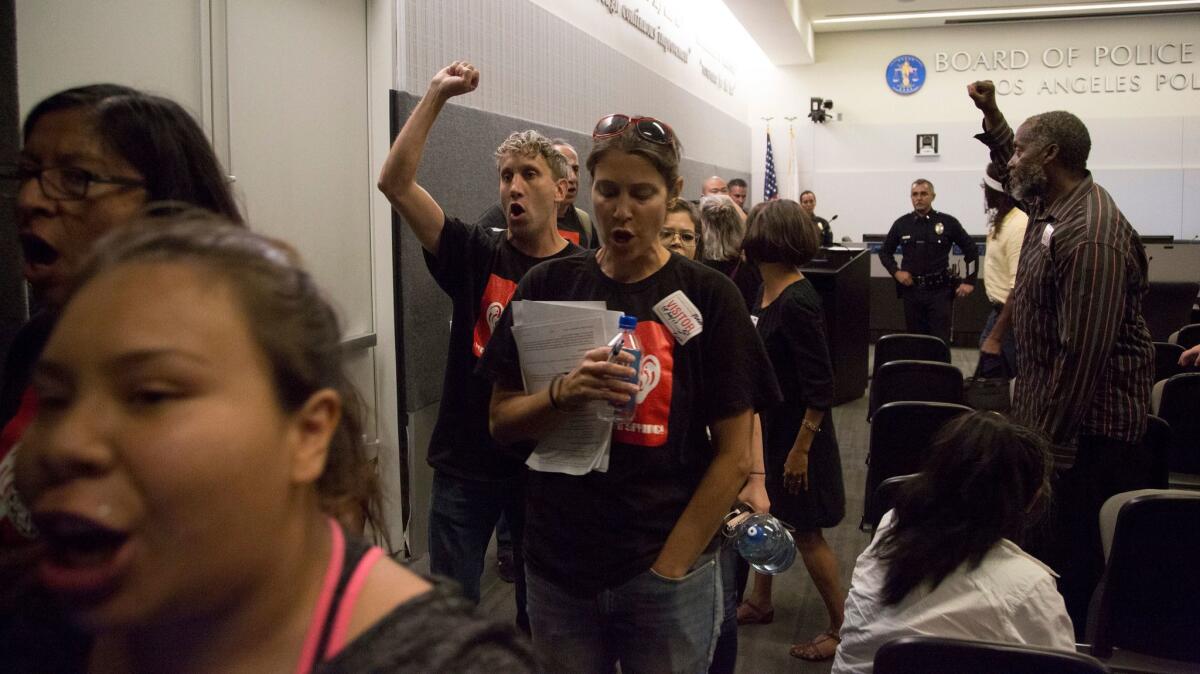Should the LAPD use drones? Here’s what’s behind the heated debate
- Share via
For more than three years, a pair of drones donated to the Los Angeles Police Department was locked away, collecting dust after a public outcry over the idea of police using the controversial technology.
Seattle police saw a similar backlash when they wanted to use the devices, grounding their drone program before it even took off. And recently, the Los Angeles County Sheriff’s Department’s use of a drone has been criticized by activists as well as civilian oversight commissioners who want the agency to stop.
On Tuesday, the LAPD again waded into the heated debate, saying the department wanted to test the use of drones in a one-year pilot program.
Drones have been hailed by law enforcement across the country as a valuable technology that could help find missing hikers or monitor armed suspects without jeopardizing the safety of officers. But efforts to deploy the unmanned aircraft have frequently drawn fierce criticism from privacy advocates or police critics for whom the devices stir Orwellian visions of inappropriate — or illegal — surveillance and fears of military-grade, weaponized drones patrolling the skies.
The LAPD saw that resistance Tuesday even before department brass unveiled details of their proposal to the Police Commission. About three dozen activists gathered before the board’s morning meeting to denounce any use of drones by the department. When the presentation ended, some of those activists leapt to their feet.
“Drone-free LAPD, no drones L.A.!” they chanted.
The LAPD’s vision, if approved by the Police Commission, is to fly a small drone — measuring about a foot long and 7 ½ inches tall — during incidents such as standoffs with hostage-takers or barricaded suspects, bomb scares, or shootings where a gunman is still targeting people. The devices could help gather crucial information as such situations unfold, without putting officers at risk, Assistant Chief Beatrice Girmala said.
The LAPD would draw up strict criteria before flying drones, she said. Each use would require the approval of a high-ranking department official and would be documented in a written report to ensure that the rules were followed, she added.
The LAPD plans to hold public meetings and draft guidelines that must be approved by the Police Commission before the drones can be flown. The department would also need certification from the Federal Aviation Administration and to train officers to use the devices, Girmala said. The process could take a few months.
When LAPD officials decided to revisit the use of drones, they wanted to take their time and not risk the public’s trust “by imposing something new that is already controversial in our community.”
“In our discussions, it was very clear that if this were ever to be approved, it had to be very methodical and it had to be very thoughtful,” she said.
It’s a sharp contrast to the approach taken by the Los Angeles County Sheriff’s Department in launching its drone. That initiative was abruptly announced by Sheriff Jim McDonnell at a January press conference before the department had collected public feedback and after deputies had already been trained to fly the device.

The decision stirred outrage. Activists staged a protest. One civil liberties advocate blasted what he described as a “unilateral decision” by the department. Several members of the Sheriff Civilian Oversight Commission also expressed concern, saying they’d like the Sheriff’s Department to stop flying the drone.
But the commission has no direct authority to compel the Sheriff’s Department. A sheriff’s spokeswoman said the department plans to keep using its drone — and it did so during a standoff with a gunman in East L.A. last week.
How a department approaches using a drone — and how it explains that to the public — can impact how local residents react, said Dan Gettinger, co-director of the Center for the Study of the Drone at Bard College. Many agencies have adopted the technology without much public reaction, he said.
“People are concerned because they associate the drones that police might be using with the drones that are being used by the military,” Gettinger said. “The word ‘drone’ just has that implication.”
Almost 350 public safety departments in the U.S. have acquired drones, nearly half of them last year, according to a study Gettinger’s center published earlier this year. Skeptics have expressed apprehension not just about how police use drones today, he said, but how they might be used in the future.
“We’ve just hit the tip of the iceberg,” Gettinger said. “The systems are going to evolve, and that’s going to bring with them questions about how they’re going to be used.”
Drones have already prompted a flurry of legislative action.
In an attempt to strike a balance between privacy and public safety, at least 18 states have adopted rules requiring law enforcement agencies to obtain warrants before using drones to conduct surveillance or searches, according to the National Conference of State Legislatures. A similar proposal by the California Legislature was vetoed by Gov. Jerry Brown in 2014.
But legislation in some states has deepened the alarm of drone opponents. In 2015, North Dakota became the first state to legalize the police use of drones equipped with less-lethal devices, such as tear gas, rubber bullets or Tasers. Connecticut flirted with a similar bill earlier this year that would have allowed police to weaponize drones there.
In a nod to those worries, Girmala said the LAPD’s drones would not be weaponized and that officers would still need to get a search warrant signed by a judge when necessary.
”What we’re looking at ... is really just another set of eyes,” LAPD Chief Charlie Beck said after the commission meeting.
The LAPD’s dance with drones began in 2014, when the department received two Draganflyer X6 drones from police in Seattle — drones the Washington agency unloaded after heavy criticism from the public.
Although the LAPD said it would deploy the drones for “narrow and prescribed uses,” civil liberties advocates questioned their use in even a limited fashion. Less than a week after getting the drones, Beck said he would not fly them until the department had sought public feedback as well as approval from the Police Commission.
“I will not sacrifice public support for a piece of police equipment,” Beck said at the time.
The drones were locked away in the office of the LAPD’s inspector general. They were destroyed earlier this week, Girmala said, because they were “obsolete” and not what the department is considering using now. The department hasn’t yet looked at specific models to test in a pilot program, she added.
Opponents of police drones were not satisfied by the LAPD’s pledge to use them only under strict rules. In addition to expressing fears about surveillance and the militarization of police, drone opponents said Tuesday that they worried about “mission creep” — that police would quietly expand the use of drones beyond what is first allowed. The activists said they didn’t trust the LAPD to use the drones appropriately and said the fear of being watched by the LAPD from the sky was alarming to residents who already feel targeted by police.
When Girmala told the Police Commission that SWAT officers would use the drones, many opponents in the room jeered.
“We’re going to fight it to the very end,” said Jamie Garcia, a member of the Stop LAPD Spying Coalition, one of the department’s most vocal critics. “Just drop the idea. It’s not going to happen.”
Matt Johnson, the Police Commission’s president, said he thought drones had the potential to help save lives, and he signaled support for developing a pilot program.
”Our challenge is going to be to develop strong policies and oversight to govern this program, to govern against misuse and mission creep,” he said. “It’s also critical that we get public opinion like we received today.”
That feedback should be taken seriously in deciding “whether to move forward at all,” said Melanie Ochoa, an attorney with the American Civil Liberties Union of Southern California.
“Drones represent a significant threat to privacy,” she told commissioners. “They should only be approved after a robust public discussion.”
The union representing rank-and-file LAPD officers dismissed the criticism Tuesday, saying in a statement that drones were a “commonsense tool that can ensure resident and officer safety in dangerous situations.”
“It’s time for the conspiracy theorists and professional protesters to stop obstructing every effort we make to keep Angelenos safe,” the union added.
Both Beck and Girmala acknowledged that the fiercest critics would probably never support the LAPD’s use of drones. But Girmala said she hoped the department’s public process for evaluating the technology would help reassure others.
“We sincerely understand and respect those concerns,” she said. “But I believe … that time will prove that we are being as careful and respectful of peoples’ rights as humanly possible.”
ALSO
‘May you die in pain’: California GOP congressman gets an earful at town hall
Deportation put on hold for man detained by ICE after dropping daughter off at L.A. school
UPDATES:
7:35 p.m.: This story was updated with comments from opponents of police drones, LAPD officials, the police union and Police Commission President Matt Johnson.
12:55 p.m.: This story was updated with comments from Assistant Chief Beatrice Girmala at the Police Commission.
9:45 a.m.: This story was updated with comments from a news conference held by activists opposing the LAPD’s use of drones.
This story was originally published at 4 a.m.
More to Read
Sign up for Essential California
The most important California stories and recommendations in your inbox every morning.
You may occasionally receive promotional content from the Los Angeles Times.











